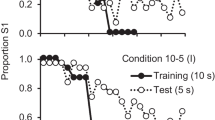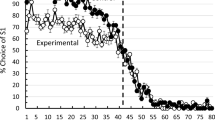Abstract
Delaying reinforcement typically has been thought to retard the rate of acquisition of an association, but there is evidence that it may facilitate acquisition of some difficult simultaneous discriminations. After describing several cases in which delaying reinforcement can facilitate acquisition, we suggest that under conditions in which the magnitude of reinforcement is difficult to discriminate, the introduction of a delay between choice and reinforcement can facilitate the discrimination. In the present experiment, we tested the hypothesis that the discrimination between one pellet of food for choice of one alternative and two pellets of food for choice of another may be a difficult discrimination when choice consists of a single peck. If a 10-s delay occurs between choice and reinforcement, however, the discrimination is significantly easier. It is suggested that when discrimination between the outcomes of a choice is difficult and impulsive choice leads to immediate reinforcement, acquisition may be retarded. Under these conditions, the introduction of a brief delay may facilitate acquisition.

Similar content being viewed by others
References
Ainslie GW (1974) Impulse control in pigeons. J Exp Anal Behav 21:485–489
Bshary R, Grutter AS (2002) Experimental evidence that partner choice is a driving force in the payoff distribution among cooperators or mutualists: the cleaner fish case. Ecol Lett 5:130–136
Grossi V (1981) Pigeon short-term memory: the effects of intertrial interval duration and illumination in a successive delayed matching-to-sample procedure. Unpublished master’s thesis, Wilfrid Laurier University, Waterloo, Ontario, Canada
Holland PC (2000) Trial and intertrial durations in appetitive conditioning in rats. Anim Learn Behav 28:121–135
Hull CL (1943) Principles of behavior. Appleton-Century-Crofts, New York
Kurth-Nelson Z, Redish AD (2012) Don’t let me do that!—models of precommitment. Front Neurosci 6:138. https://doi.org/10.3389/fnins.2012.00138
McDevitt MA, Spetch ML, Dunn R (1997) Contiguity and conditioned reinforcement in probabilistic choice. J Exp Anal Behav 68(3):317–327. https://doi.org/10.1901/jeab.1997.68-317
Pepperberg IM, Hartsfield LA (2014) Can Grey parrots (Psittacus erithacus) succeed on a “complex” foraging task failed by nonhuman primates (Pan troglodytes, Pongo abelii, Sapajus apella) but solved by wrasse fish (Labroides dimidiatus)? J Comp Psychol 128:298–306
Rachlin H, Green L (1972) Commitment, choice and self-control. J Exp Anal Behav 17:15–22
Rayburn-Reeves RM, Laude JR, Zentall TR (2013) Pigeons show near-optimal win-stay/lose-shift performance on a simultaneous-discrimination, midsession reversal task with short intertrial intervals. Behav Proc 92:65–70. https://doi.org/10.1016/j.beproc.2012.10.011
Renner KE (1964) Delay of reinforcement: a historical view. Psychol Bull 61:341–361
Salwiczek LH, Prétôt L, Demarta L, Proctor D, Essler J, Pinto AI, Wismer S, Stoinski T, Brosnan SF, Bshary R (2012) Adult cleaner wrasse outperform capuchin monkeys, chimpanzees, and orang-utans in a complex foraging task derived from cleaner–client reef fish cooperation. PLoS ONE 7:e49068. https://doi.org/10.1371/journal.pone.0049068
Santi A (1984) The trial spacing effect in delayed matching-to-sample by pigeons is dependent upon the illumination condition during the intertrial interval. Can J Psychol 38:154–165
Siegel E, Rachlin H (1995) Soft commitment: self-control achieved by response persistence. J Exp Anal Behav 64:117–128
Smith AP, Beckmann JS, Zentall TR (2017) Gambling-like behavior in pigeons: ‘jackpot’ signals promote maladaptive risky choice. Nat Sci Rep 7:6625. https://doi.org/10.1038/s41598-017-06641-x
Stagner JP, Zentall TR (2010) Suboptimal choice behavior by pigeons. Psychon Bull Rev 17:412–416
Zentall TR, Raley OL (2019) Object permanence in the pigeon: insertion of a delay prior to choice facilitates visible- and invisible-displacement accuracy. J Comp Psychol 133:132–139
Zentall TR, Case JP, Luong J (2016) Pigeon’s paradoxical preference for the suboptimal alternative in a complex foraging task. J Comp Psychol 130:138–144
Zentall TR, Andrews DM, Case JP (2017a) Prior commitment: its effect on suboptimal choice in a gambling-like task. Behav Proc 145:1–9
Zentall TR, Case JP, Berry JR (2017b) Early commitment facilitates optimal choice by pigeons. Psychon Bull Rev 24(3):957–963
Zentall TR, Case JP, Berry JR (2017c) Rats' acquisition of the ephemeral reward task. Anim Cogn 20:419–425
Author information
Authors and Affiliations
Corresponding author
Ethics declarations
Conflict of interest
The authors declare that they have no conflict of interest.
Ethical approval
All applicable international, national, and/or institutional guidelines for the care and use of animals were followed.
Additional information
Publisher's Note
Springer Nature remains neutral with regard to jurisdictional claims in published maps and institutional affiliations.
Rights and permissions
About this article
Cite this article
House, D., Peng, D. & Zentall, T.R. Pigeons can learn a difficult discrimination if reinforcement is delayed following choice. Anim Cogn 23, 503–508 (2020). https://doi.org/10.1007/s10071-020-01352-9
Received:
Revised:
Accepted:
Published:
Issue Date:
DOI: https://doi.org/10.1007/s10071-020-01352-9




